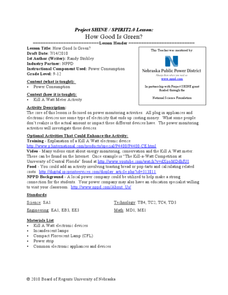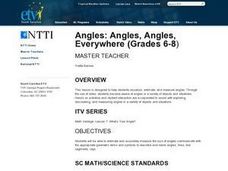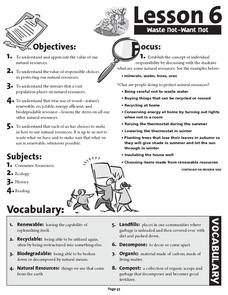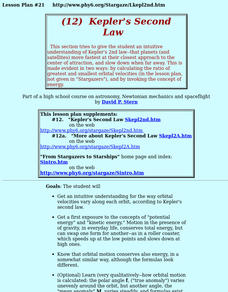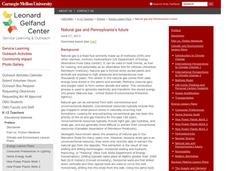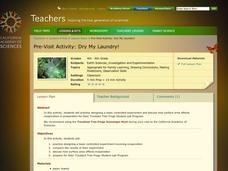Curated OER
How Green Are We?
Middle schoolers identify and interpret the importance of energy efficiency in connection with air pollution. They communicate with families and peers about ways to more effectively contribute to the reduction of air pollution. ...
Curated OER
The Envelope System: A Partial Solution
Studnet identify examples of conduction, convection and radiation. They develop an example of a building envelope. They also describe how heat transfer mechanisms can affect home energy costs.
Curated OER
Designing "Green" to Save Our Green Planet
Students design an environmentally friendly home. In this middle school math/science instructional activity, students watch videos on creating green design. Students work in collaborative groups to determine what makes a house green...
Curated OER
How Good Is Green?
Students explore the amount of electricity used and wasted in homes and at school using kilowatt meters. In this environmental energy lesson, students compute power usage by appliances over time and identify ways in which electricity is...
Curated OER
Angles: Angles, Angles, Everywhere
Students practice estiminating and measuring angles. After watching a short video, they identify angles in objects in the classroom and their homes. In groups, they participate in activities in which they are given a scenerio and are...
Outdoor Learning Center
Outdoor Survival
Which of the following can you survive without for the longest time: water, food, or a positive mental attitude? The answer may surprise you. Guide learners of all ages through games, activities, and discussions about surviving in the...
University of Georgia
Land Biomes Project
Challenge scholars to research a biome and create a presentation for the producers of Survivor to choose their ecosystem for the next season's show. The materials include outlines, worksheets, and grading rubrics for individuals as well...
Curated OER
Momentum
Students learn the concepts of momentum and its conservation, using the recoil of a cannon as an example. They examine how momentum is a vector, allowing its conservation to be applied to problems in 2 and 3 dimensions.
Curated OER
Energetic Citizenship
Students analyze how to use less energy. In this energy conservation lesson, students discuss fluorescent and incandescent light bulbs and experiment to examine the energy of both sources using thermometers. Students complete the Wattage...
Curated OER
Second Time Around
Pupils explore how items can be reused. In this recycling lesson plan, students present skits about reusing materials and brainstorm products that can be reused at home, school and in the classroom.
Curated OER
The Earth, Sun Mood and Stars Unit (Planets too!)
Fifth graders prepare five activities to do then show their energy saving skills. In this investigative lesson students create five projects then participate in an energy saving demonstration.
Curated OER
Green Building and Development
In this environment worksheet, students find the solutions to building an environmentally friendly home and they examine the long-terms costs associated with ownership.
Curated OER
A Tree Is More than a Street Name
Eighth graders discuss the role of trees as one of the most important natural resources. In groups, they examine how the forests nearby helped to shape their urban city. Using the internet, they research the use of the forest in early...
Forest Foundation
Waste Not - Want Not
Recycling is the focus in the sixth of a nine-instructional activity series devoted to forest ecosystems. Class members read an article about the responsible use of natural resources and ways to reduce land fill.
Curated OER
Kepler's Second Law
High schoolers gain an understanding of Kepler's 2nd law--that planets (and satellites) move fastest at their closest approach to the center of attraction, and slow down when far away. They explore the concepts of "potential energy" and...
Carnegie Mellon University
Natural Gas and Pennsylvania’s Future
Beginning with a general discussion about natural gas, methane, and hydrocarbons, a few videos and diagrams are projected to support the lecture. Individuals participate in a brief activity by drinking juice through a straw, and then...
Teach Engineering
Circuits
Don't know how to make the initial connection on electric circuits? This lesson provides the background to present the introductory vocabulary to learning about electric circuits. It is organized in a meaningful progression with an...
California Academy of Science
Dry My Laundry!
Meant to be a pre-field trip lesson, this can also serve as a cute and simple activity to use when your little ones are learning about evaporation or surface area. The children cut tiny t-shirts out of paper towel material, wet them, and...
Curated OER
Oil on the Beach
Students explore how oil pollutes the oceans. In this science lesson, students investigate various materials that could be used to clean up an oil spill. Students discuss which materials worked best and how humans can reduce oil spills.
NASA
Soda Straw Rockets
Three, two, one, blast off to a better understanding of force and motion with this exciting science lesson! Beginning with a discussion about rockets and gravity, young scientists go on to complete a series of worksheets about net forces...
ProCon
Daylight Savings Time
An entomologist named Geroge Vernon Hudson is credited with proposing Daylight Saving Time (DST) so he could better study his insects. Using the informative website, scholars read a brief introduction to the topic and then explore the...
Curated OER
Informational Reading: Electronics Are Made from Resources
In this comprehension worksheet, students read about the making of a computer: circuit boards, hard drives, monitors and plastic housings. Students then answer 3 multiples choice questions.
Curated OER
Technology has a Solution!
In this technology worksheet, students summarize four things they learned about technology and the environment. Students then write a report that outlines how technology is solving environmental issues.
Curated OER
How Big is Your Footprint?
Students create awareness for ways in which the "Western" lifestyle negatively impacts the Earth. They create awareness for alternatives to our current ways of living, eating and traveling. Students are challenged to talk with their...





